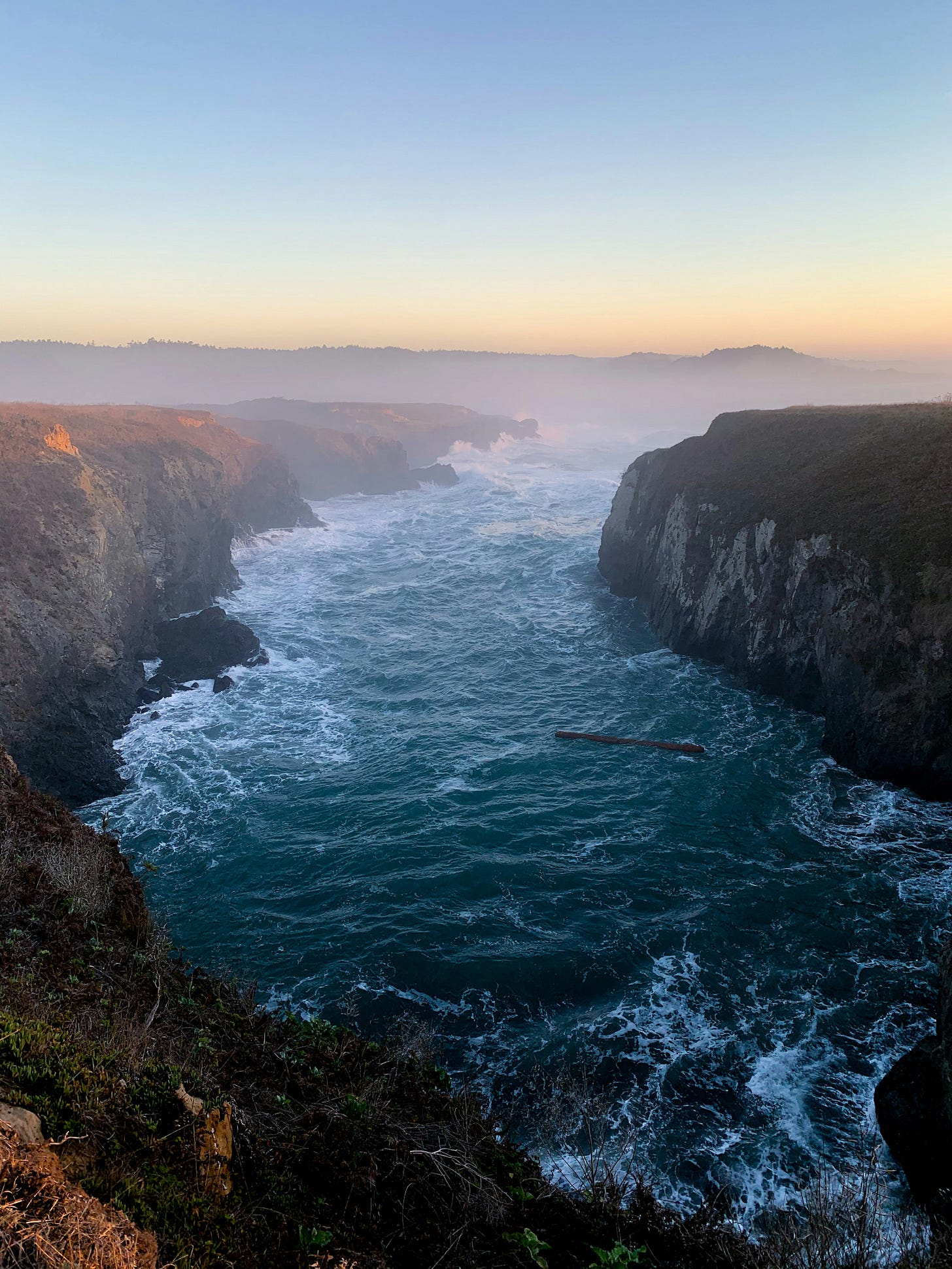The Story I Haven't Told
"Talk to me of Mendocino, closing my eyes I hear the sea." Kate & Anna McGarrigle

A friend recently asked me, “Why don’t you ever write about Mendocino?”
We’ve heard about your adventures in Portugal and Bali and Hong Kong and Amsterdam why not Mendocino?
Mendocino is one of my favorite places. The redwoods meet the ocean, and rivers meander through the Anderson Valley wine country until they reach the sea. It’s where I birthed both of my human babies and raised my first business baby. When I get nostalgic for a place and time, it’s often for Mendocino.
So why don’t I write about it?
Perhaps because to talk about Mendocino means talking about my emotionally abusive marriage. Or pretending that part of my life didn’t exist. And as a writer, that’s like saying, write, but don’t let your soul speak.
There’s a particular shame in being in an abusive relationship. It might seem counterintuitive—I wasn’t the abuser—I didn’t do anything wrong. But shame whispers, What’s wrong with YOU? It’s hard to examine why anyone would allow someone to treat them poorly, to endure it. It’s even harder when you appear smart and competent in every other area of your life. Good businesswoman? Check. Great mom? Check. Solid friend? Yup. So how do you reconcile being all of those things with allowing less than great behavior from the person meant to love you most?
I’ve often said it would have been easier if he had just hit me. Bruises on the outside are hard to deny. It’s the bruises on the inside—on your soul, on your sense of self—that are maddening. Did that really happen? Did he really say that? Our brains seek meaning. We want to live in a rational universe, so it’s easier to think you’re crazy than to accept that sometimes love is pain.
But there’s more to it than that. It’s why I’m writing this post.
There’s a sneaky and insidious dynamic called the triangle of abuse. Two friends recently lived out their own version of this, and I was shocked they didn’t recognize it. What I’ve discovered is that abusers rarely see themselves as bad people. Who does? So they need something to justify their actions—enter the victim. The victimization can be as simple as someone setting a boundary or failing to meet an unspoken expectation. Maybe they didn’t feel appreciated enough. The slight is usually in their own mind. But once they feel like a victim, it gives them permission to lash out. Offending from the victim position is the technical term.
Once you see it, you can’t unsee it—people, countries, politicians—it’s everywhere.
But the real mindfuck happens after the abuse. The abuser, now the asshole, needs to be the victim again for the cycle to continue. So what do they do? Something nice. They rescue you. They show up as the sweet, warm, loving, generous person you fell for. The person you knew was there. Now they’re a good person again, just waiting to be misunderstood, unappreciated, or slighted. The cycle starts over. And that’s where the crazy-making begins. How can this person be both? How do you reconcile the two? You can’t and the only way out is to start seeing the kindnesses for what they really are - set ups in a pattern.
The hardest addiction to overcome isn’t heroin or nicotine. It’s gambling. Because with most addictions, the trajectory is a downward spiral. But with gambling? Sometimes you win. That’s the hook—the maybe. Maybe this time will be different. Maybe this time, I’ll get the version of them I fell in love with.
But it never works that way.
I eventually left my marriage. Like any wound, the scars eventually fade, so that a casual observer might not even notice. But one scar never truly heals: Can I trust myself? No one thinks they’ll pick an abusive partner. So how do you know it won’t happen again?
Maybe that’s why I don’t write about Mendocino. Because every beautiful landscape has an underbelly, every year abalone divers die in the undertow and every majestic redwood casts a shadow. The hardest part of healing isn’t forgetting or forgiving —it’s learning to trust yourself again - to see the beauty and the shadow.
It’s been said you’re only as sick as your secrets. I’m not sure if that’s true. But I do know this: if in sharing our stories, just one other person sees the pattern, feels less alone, less crazy, less broken—then maybe, just maybe, the scars can be put in service of something beautiful.
But to do that, we have to stop injecting Botox into our lives to smooth over the stories written on our faces and etched into our souls. Because sometimes, the hardest place to return to is the one that holds both your breaking and your becoming and maybe, just maybe, the places we don’t write about are the ones still teaching us how the story ends."





Thank you. We never know who we help when we tell about the hard stories of our lives and how we came through.
"... the places we don’t write about are the ones still teaching us how the story ends."
We always think we're supposed to quickly make sense of what's transpired. I'm moved to think that this is not necessarily how it goes. There is something to be said about letting things come to us when it's time.
What a share, though. That hero image at the outset... wow. So unassuming at first glance. I just stopped and felt myself pulled into that water. It suddenly felt so unsafe.